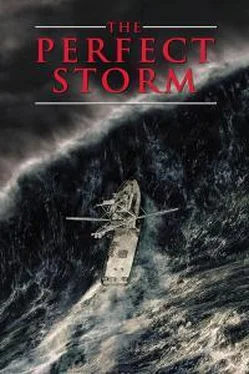Sebastian Junger - The Perfect Storm
Здесь есть возможность читать онлайн «Sebastian Junger - The Perfect Storm» — ознакомительный отрывок электронной книги совершенно бесплатно, а после прочтения отрывка купить полную версию. В некоторых случаях можно слушать аудио, скачать через торрент в формате fb2 и присутствует краткое содержание. Жанр: Триллер, Проза. Описание произведения, (предисловие) а так же отзывы посетителей доступны на портале библиотеки ЛибКат.
- Название:The Perfect Storm
- Автор:
- Жанр:
- Год:неизвестен
- ISBN:нет данных
- Рейтинг книги:3 / 5. Голосов: 1
-
Избранное:Добавить в избранное
- Отзывы:
-
Ваша оценка:
- 60
- 1
- 2
- 3
- 4
- 5
The Perfect Storm: краткое содержание, описание и аннотация
Предлагаем к чтению аннотацию, описание, краткое содержание или предисловие (зависит от того, что написал сам автор книги «The Perfect Storm»). Если вы не нашли необходимую информацию о книге — напишите в комментариях, мы постараемся отыскать её.
The Perfect Storm — читать онлайн ознакомительный отрывок
Ниже представлен текст книги, разбитый по страницам. Система сохранения места последней прочитанной страницы, позволяет с удобством читать онлайн бесплатно книгу «The Perfect Storm», без необходимости каждый раз заново искать на чём Вы остановились. Поставьте закладку, и сможете в любой момент перейти на страницу, на которой закончили чтение.
Интервал:
Закладка:
That was happening throughout the fishing industry: haddock landings had plummeted to one-fiftieth of what they were in 1960, cod landings had dropped by a factor of four. The culprit—as it almost always has been in fishing— was a sudden change in technology. New quick-freeze techniques allowed boats to work halfway around the world and process their fish as they went, and this made the three-mile limit around most countries completely ineffectual. Enormous Russian factory ships put to sea for months at a time and scoured the bottom with nets that could take thirty tons of fish in a single haul. They fished practically within sight of the American coast, and within years the fish populations had been staggered by fifty-percent losses. Congress had to take action, and in 1976 they passed the Magnuson Fishery Conservation and Management Act, which extended our national sovereignty to two hundred miles offshore. Most other nations quickly followed suit.
Of course, the underlying concern wasn't for fish populations, it was for the American fleet. Having chased out the competition, America set about constructing an industry that could scrape Georges Bank just as bare as any Russian factory ship. After the passage of the Magnuson Act, American fishermen could take out federally guaranteed loans and set themselves up for business in quarter-million-dollar steel boats. To make matters worse, the government established eight regional fishing councils that were exempt from conflict-of-interest laws. In theory, this should have put fisheries management in the hands of the people who fished. In reality, it showed the fox into the chicken coop.
Within three years of Magnuson, the New England fleet had doubled to 1,300 boats.
Better equipment resulted in such huge takes that prices dropped and fishermen had to resort to more and more devastating methods just to keep up. Draggers raked the bottom so hard that they actually levelled outcrops and filled in valleys—the very habitats where fish thrived. A couple of good years in the mid-eighties masked the overall decline, but the end was near, and many people knew it. The first time anyone—at least any fisherman— suggested a closure was in 1988, when a Chatham fisherman named Mark Simonitsch stood up to speak at a New England Fisheries Council meeting. Simonitsch had fished off Cape Cod his whole life; his brother, James, was a marine safety consultant who had worked for Bob Brown.
Both men knew fishermen, knew fish, and knew where things were headed.
Simonitsch suggested that Georges Bank be closed to all fishing, indefinitely. He was shouted down, but it was the beginning of the end.
The swordfish population didn't crash as fast as some others, but it crashed all the same. By 1988, the combined North Atlantic fleet was fishing over one hundred million hooks a year, and catch logs were showing that the swordfish population was getting younger and younger. Finally, in 1990, the International Commission for the Conservation of Tunas suggested a fishing quota for the North Atlantic swordfish. The following year the National Marine Fisheries Service implemented a quota of 6.9 million pounds of dressed swordfish for U.S.-licensed sword boats, roughly two-thirds of the previous year's catch. Every U.S.-licensed boat had to report their catch when they arrived back in port, and as soon as the overall quota was met, the entire fishery was shut down. In a good year the quota might be met in September; in bad years it might not be met at all. The result was that not only were fishing boats now racing the season, they were racing each other. When the Andrea Gail left port on September 23rd, she was working under a quota for the first time in her life.
ALBERT JOHNSTON has the Mary T back out on the fishing grounds by October 17th and his gear in the water that night. He's a hundred miles south of the Tail, right on the edge of the Gulf Stream, around 41 north and 51 west. He's after big-eye tuna and doing really well—"muggin' 'em," as swordfishermen say. One night they lose $20,000 worth of bigeye to a pod of killer whales, but otherwise they're pulling in four or five thousand pounds of fish a night. That's easily enough to make a trip in ten sets. They're in the warm Gulf Stream water and the rest of the fleet's off to the east. "At that time of the year it's nice to fish down by the Gulf," Johnston says. "You get a little less bad weather— the lows tend to ride the jet stream off to the north. You could still get the worst storm there ever was, but the average weather's a little better."
Like most of the other captains out there, Johnston started commercial fishing before he could drive. He was running a boat by age nineteen and bought his first one at twenty-nine. Now, at thirty-six, he has a wife and two children and a small business back in Florida. He sells fishing tackle to commercial boats. There comes a point in every boat owner's life—after the struggles of his twenties, the terror of the initial investment—when he realizes he can relax a bit. He doesn't need to take late-season trips to the Banks, doesn't need to captain the boat month in and month out. At thirty-six, it's time to start letting the younger guys in, guys who have little more than a girlfriend in Pompano Beach and a pile of mail at the Crow's Nest.
Of course, there's also the question of odds. The more you go out, the more likely you are never to come back. The dangers are numerous and random: the rogue wave that wipes you off the deck; the hook and leader that catches your palm; the tanker that plots a course through the center of your boat. The only way to guard against these dangers is to stop rolling the dice, and the man with a family and business back home is more likely to do that. More people are killed on fishing boats, per capita, than in any other job in the United States. Johnston would be better off parachuting into forest fires or working as a cop in New York City than longlining off the Flemish Cap. Johnston knows many fishermen who have died and more than he can count who have come horribly close. It's there waiting for you in the middle of a storm or on the most cloudless summer day.
Boom—the crew's looking the other way, the hook's got you, and suddenly you're down at the depth where swordfish feed.
Back in 1983, a friend of Johnston's ran into a fall gale in an eighty-seven-foot boat called the Canyon Explorer. Three lows merged off the coast and formed one massive storm that blew one hundred knots for a day and a half. The seas were so big that Johnston's friend had to goose the throttle just to keep from sliding backward down their faces. The boat was forced sixty miles backward—despite driving full-steam ahead—because the whole surface of the ocean had been set in motion. At one point the captain glanced out the window and saw an enormous wave coming at them. Hey Charlie, look at this! he shouted to another crew member who was down below. Charlie sprinted up the companionway but didn't get to the wheelhouse in time; the wave bore down on them, slate-colored and foaming, and blew the wheelhouse windows out.
That happened to be a particularly severe storm, and it devastated the rest of the fleet. A boat named the Lady Alice had her wheelhouse knocked in and a crew member paralyzed for life. The Tiffany Vance, which had just transferred fisheries observer Joseph Pelczarski to the Andrea Gail the week before, nearly went down with her sister ship, the Rush. The two boats were a mile apart when the storm hit, way out on the Flemish Cap, and both lost their portside stabilizing birds. The bird on the Tiffany Vance was hung from chain, and without 200 pounds of steel to keep it down, the chain started slamming against the boat. It had to be cut; Alex Bueno, the captain, stripped to his underwear, tied a rope around his waist, and waded out onto the deck with a welding torch. There was so much water coming over the deck that he had trouble keeping the torch lit. He finally managed to burn the chain free, and then he went back inside and waited for the boat to sink. "We didn't even bother calling the Coast Guard, we were just too far out,” he says. "There's really nothing to do but rely on the other guys around you."
Читать дальшеИнтервал:
Закладка:
Похожие книги на «The Perfect Storm»
Представляем Вашему вниманию похожие книги на «The Perfect Storm» списком для выбора. Мы отобрали схожую по названию и смыслу литературу в надежде предоставить читателям больше вариантов отыскать новые, интересные, ещё непрочитанные произведения.
Обсуждение, отзывы о книге «The Perfect Storm» и просто собственные мнения читателей. Оставьте ваши комментарии, напишите, что Вы думаете о произведении, его смысле или главных героях. Укажите что конкретно понравилось, а что нет, и почему Вы так считаете.












